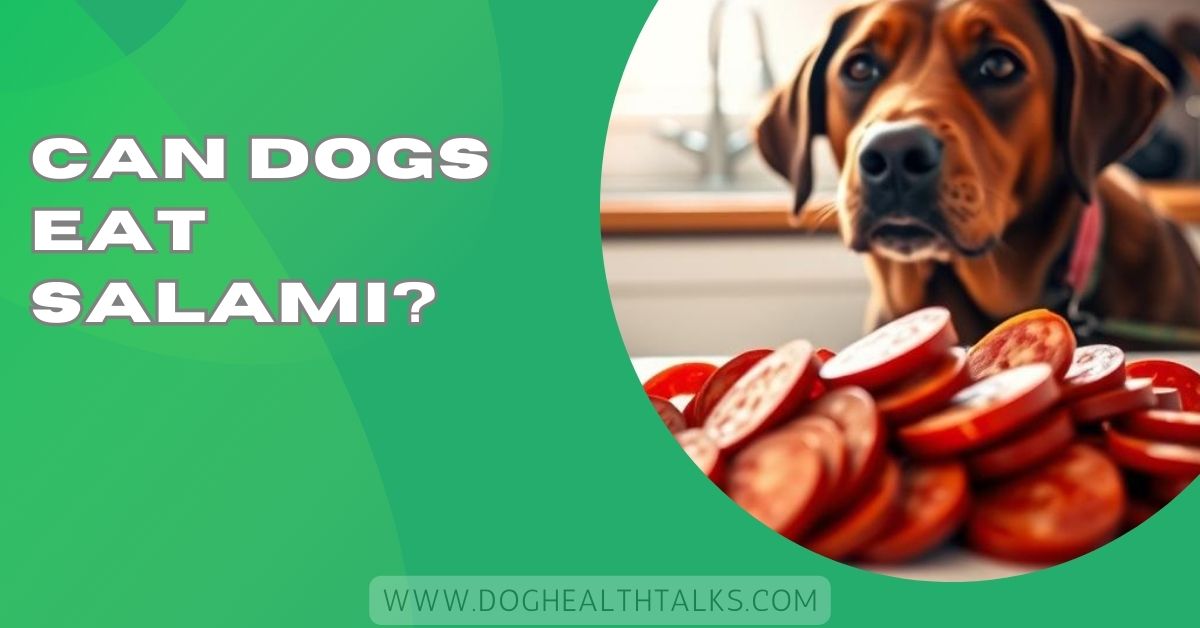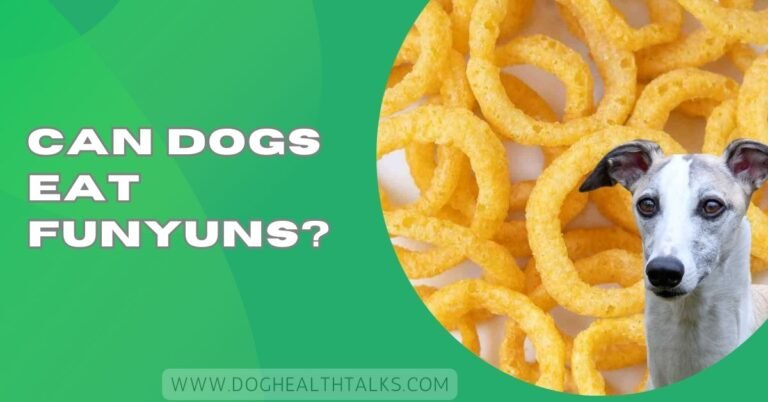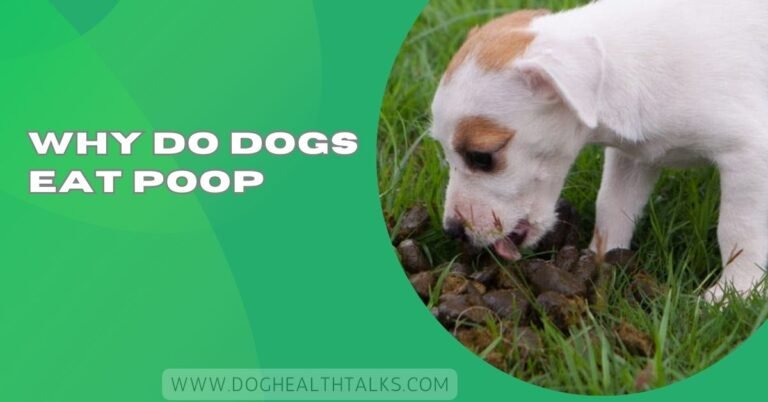Can Dogs Eat Salami? – Expert Guide for Pet Owners!
Can Dogs Eat Salami is an important topic for pet owners because processed meats like salami can directly affect a dog’s digestion and overall health.When you sit down with a tasty snack, it’s natural for your dog to give you those big, hopeful eyes.
As pet parents, we often wonder if sharing is safe, especially when it comes to salty meats like salami or pepperoni.
Dogs shouldn’t eat salami. It’s high in sodium, fat, and spices, which can upset digestion and harm health. While one slice may not cause serious issues, regular feeding is unsafe.
This guide will explore whether dogs can eat salami and what healthier choices you can offer instead.
What Is Salami?
Salami is a type of cured meat. It is usually made from pork or beef and mixed with salt, spices, garlic, and preservatives. Salami is dried and processed, which helps it last longer without refrigeration.
For humans, salami may taste great. For dogs, it is a very different story.
Why Salami Isn’t Ideal for Dogs
Salami is tasty for humans, but it’s not a safe choice for your dog. It’s packed with salt, fat, and seasonings that can upset their stomach and even cause long-term problems like obesity, high blood pressure, or pancreatitis.
Some recipes also contain garlic or onion powder, which are toxic to dogs. Even though one bite won’t usually harm them, salami doesn’t offer any real health benefits for pets. Choosing simple, plain meats is a much safer way to treat your pup.
What if Your Dog Eats Salami?
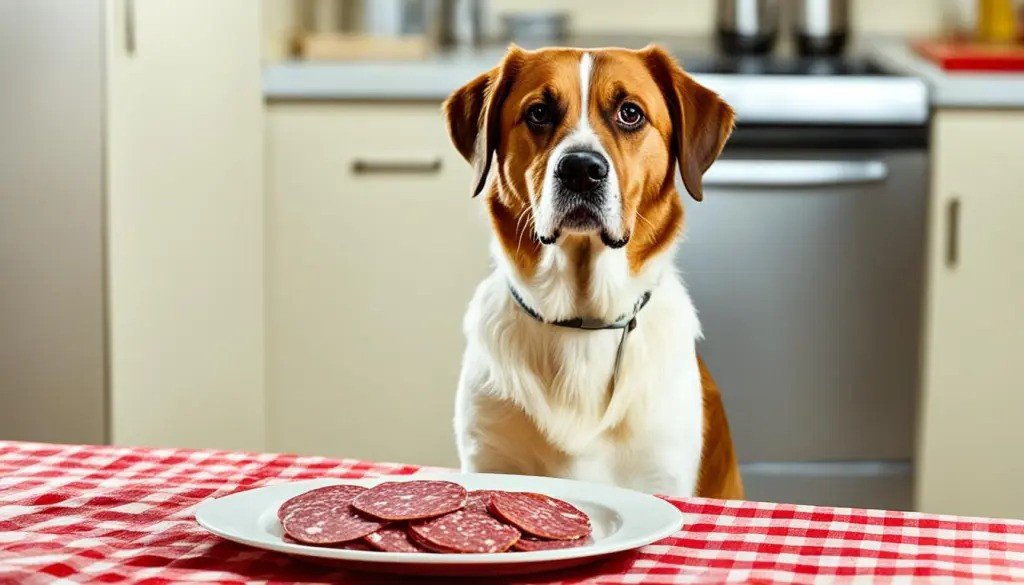
If your dog grabs a slice of salami, don’t panic. Most healthy dogs can handle a small piece without significant issues, but watch for vomiting, diarrhoea, or extra thirst. If your dog eats several slices or an entire pack, it’s best to call your vet immediately.
Puppies, small breeds, and dogs with health problems are more sensitive to salty, fatty foods. A quick phone call to your veterinarian can give you peace of mind and keep your dog safe.
The Type of Salami Doesn’t Matter
Whether turkey salami, dry salami, or a “low-fat” version, it’s still not a safe option for your dog. All types are processed with high amounts of sodium, fat, and preservatives, which make them unhealthy for pets.
Some also contain spices like garlic or onion powder, which are dangerous for dogs. The name or flavour might change, but the risks remain the same.
Instead of experimenting with different kinds of salami, stick to healthier snacks that actually support your dog’s well-being.
Also Read: Can Dogs Eat Sugar? – The Truth Every Owner Should Know!
Is Salami Safe for Dogs?
Salami is not safe for dogs. It contains ingredients that a dog’s body cannot handle well. Even though dogs are meat eaters, not all meats are safe for them.
Salami is:
- Very high in salt
- High in fat
- Full of spices and seasonings
- A processed food
These things make salami unhealthy and risky for dogs.
Why Is Salami Bad for Dogs (and maybe you, too)?
Salami may look like harmless meat, but it’s far from healthy for your dog — and honestly, not great for you. One slice can contain more than 200 mg of sodium, while an average dog should only have about 100 mg a day.
That much salt can strain their kidneys and even cause salt poisoning in large amounts. Salami is also full of fat, spices, and preservatives that upset a dog’s digestion and increase the risk of pancreatitis.
On top of that, seasonings like garlic and onion powder — often added for flavour — are toxic to dogs and can damage their red blood cells.
For humans, too much processed meat has been linked to heart disease, obesity, and high blood pressure.
If salami doesn’t favour our bodies, it’s even riskier for pets with smaller systems. Choosing lean, plain meats is a safer, more innovative way to keep you and your dog healthy.
READ MORE: Can Dogs Eat Taro? – Don’t Miss This Expert Advice!
What About the High-Fat Content of Salami?
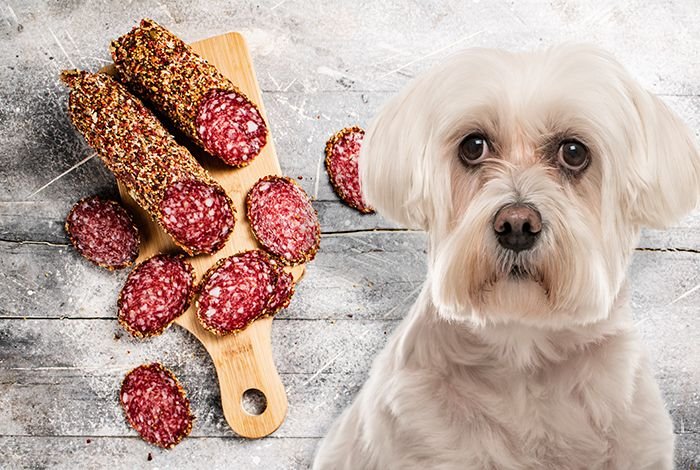
One of the most significant problems with salami is its fat content. Dogs don’t need rich, fatty foods, and when they overeat, it can quickly lead to obesity and related issues like diabetes or joint pain.
The more serious risk is pancreatitis — a painful condition in which fatty foods can inflame the pancreas after overstimulation.
Symptoms include vomiting, diarrhoea, loss of appetite, abdominal pain, and even dehydration. Pancreatitis can be life-threatening if not treated by a vet.
Even a small piece of fatty, processed meat may trigger flare-ups in sensitive dogs or breeds prone to this condition. Unlike healthy fats from foods like salmon, the fats in salami don’t offer nutritional value for your pet.
They only add stress to their digestive system. Avoiding high-fat, processed meats like salami is one of the simplest ways to protect your dog’s long-term health and keep them active, comfortable, and full of energy.
Which Human Foods are Healthy for Dogs?
- Plain, Cooked Chicken – Chicken is a lean, safe protein source supporting strong muscles and energising dogs. Always serve it plain (no seasoning, sauces, or bones). It’s also a great option if your pup has an upset stomach.
- Carrots – Crunchy, low in calories, and packed with beta-carotene, carrots are excellent for eye health and dental cleaning. Many dogs enjoy them raw as a chew treat or lightly steamed for easier digestion.
- Blueberries – Known as a “superfood,” blueberries are rich in antioxidants, fibre, and vitamins. They help protect your dog’s cells from damage and support brain and heart health.
- Pumpkin (Plain, Cooked, or Canned) – A natural source of fibre and essential vitamins, pumpkin aids digestion and helps with both constipation and diarrhoea. Always use pure pumpkin, not pumpkin pie filling.
- Plain, Cooked Salmon – Salmon contains omega-3 fatty acids, which promote a shiny coat, reduce inflammation, and support joint and heart health. Make sure it’s fully cooked to avoid harmful parasites.
- Apples (No Seeds) – Apples are a refreshing source of vitamins A and C and fibre. They can freshen your dog’s breath and support immune health, but always remove the seeds and core before serving.
- Green Beans – Low in calories and high in fibre, green beans are perfect for dogs needing weight management. Serve them plain and avoid canned versions with added salt.
- Plain Rice – White or brown rice (cooked, unsalted) is gentle on the stomach, making it ideal for dogs recovering from digestive upset. It’s often paired with boiled chicken for a bland, healing diet.
- Peanut Butter (Xylitol-Free) – A favourite for hiding medicine or filling toys, peanut butter provides protein, healthy fats, and vitamins. Always check the label to ensure it’s free from xylitol, which is toxic to dogs.
- Bananas – Naturally sweet and full of potassium, magnesium, and fibre, bananas are a safe, occasional treat. They should be given in small amounts since they contain sugar.
- Cucumbers – Hydrating, crunchy, and extremely low in calories, cucumbers are great for overweight dogs. They provide vitamins K and C while also helping with hydration.
- Eggs (Cooked, No Seasoning) are packed with high-quality protein and essential amino acids. To avoid salmonella, cook them thoroughly (scrambled or boiled), and skip any added oils or spices.
Must Read: Can Dogs Drink Gatorade? Owner’s Guide: Safe or Not!
Human Foods Dogs Should Never Eat
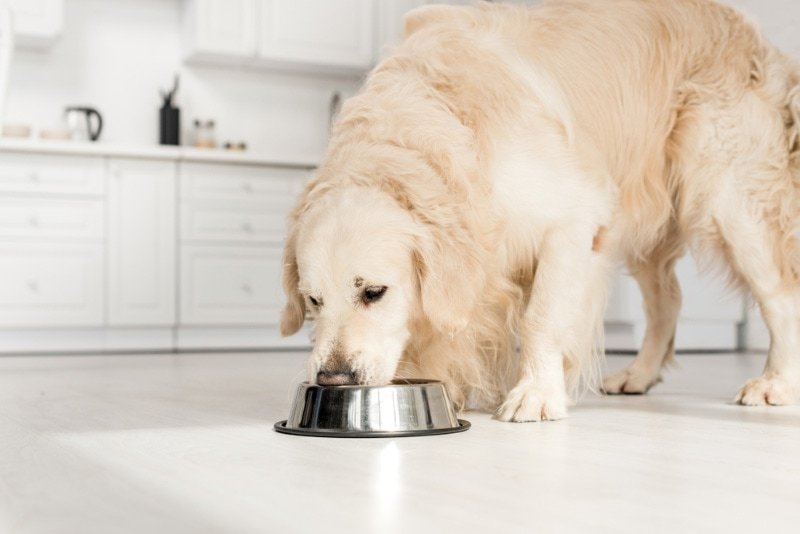
- Chocolate – Contains theobromine and caffeine, both toxic to dogs. Even small amounts can cause vomiting, rapid heartbeat, or seizures.
- Grapes and Raisins – Can lead to sudden kidney failure in dogs, with no safe quantity known.
- Onions and Garlic – Damage red blood cells, leading to anaemia. Raw, cooked, or powdered forms are all dangerous.
- Avocados – Contain persin, which can cause vomiting, diarrhoea, and heart issues in dogs.
- Alcohol – Even small sips can cause vomiting, difficulty breathing, and dangerous drops in blood sugar.
- Caffeine (coffee, tea, energy drinks) – Overstimulates the nervous system, leading to restlessness, heart problems, or even collapse.
- Xylitol (in sugar-free gum/candy) – Extremely toxic; can cause seizures, liver failure, and a deadly drop in blood sugar.
- Macadamia Nuts – Lead to weakness, tremors, and vomiting within hours of ingestion.
- Cooked Bones – Can splinter, causing choking or life-threatening injuries to the digestive tract.
- Raw Dough with Yeast – Expands in the stomach, causing bloating, pain, and dangerous fermentation that produces alcohol.
- Salty Snacks (chips, pretzels, processed foods) – Too much salt leads to dehydration, tremors, and even sodium poisoning.
- Fatty or Fried Foods – Can trigger pancreatitis, a painful and sometimes life-threatening condition in dogs.
Healthy Alternatives to Salami for Dogs
Instead of salami, try these safer options:

Plain Cooked Meat
- Boiled chicken (no skin, no salt)
- Plain turkey
- Lean beef without seasoning
Dog-Safe Fruits and Vegetables
- Carrots
- Apple slices (no seeds)
- Green beans
Dog Treats
- Store-bought dog treats made for dogs
- Homemade treats with simple ingredients
These options are much safer and healthier.
Can Puppies Eat Salami?
Puppies should never eat salami. Their stomachs are more sensitive than adult dogs. Salami can upset their digestion very quickly and may cause serious problems.
Puppies need simple, balanced food to grow strong. Salami offers no healthy benefit for them.
Can Dogs Eat Pepperoni?
Pepperoni isn’t safe for dogs. It’s high in fat, salt, and spices that can upset your dog’s stomach and even trigger pancreatitis if eaten often.
A small accidental bite usually won’t cause serious harm, but it’s best to avoid giving pepperoni. Choose healthier, plain meats like cooked chicken or turkey instead.
Can Dogs Eat Salami Raw
Raw salami isn’t safe for dogs. It often contains bacteria, high salt, and spices that can upset your dog’s stomach or cause food poisoning.
Even small amounts may lead to vomiting or diarrhoea. It’s best to avoid giving raw salami and stick with safe, plain meats prepared for dogs.
Can Dogs Digest Salami Easily
Salami is also very rich in fat, salt, and spices, which are all very harsh on a dog’s digestive tract. Even a small amount of salami can lead to stomach upset, diarrhea, vomiting, or dehydration. Due to its high fat content, it can also lead to pancreatitis in dogs, especially smaller ones.
In addition to this, salami also contains garlic, onion, or preservatives, which are all toxic to dogs if ingested on a regular basis or in large amounts.
Can Salami Kill Dogs
While a tiny bite of salami won’t usually kill a dog, eating a lot can be dangerous. Salami’s high salt, fat, and seasoning can lead to salt poisoning, pancreatitis, or even organ failure in severe cases.
Small dogs are at greater risk. It’s always safer to avoid salami and choose dog-friendly treats instead.
Read Out: Why Do Dogs Chew Their Nails: Comprehensive Guide In 2025!
Can Dogs Eat Cheese
Most dogs can eat small amounts of plain cheese, and many love it as a treat. Cheese is rich in protein and calcium, but also high in fat.
Too much can cause weight gain or stomach upset, especially in lactose-intolerant dogs. Stick to small pieces of low-fat cheese given only once in a while.
Can Dogs Eat Ham
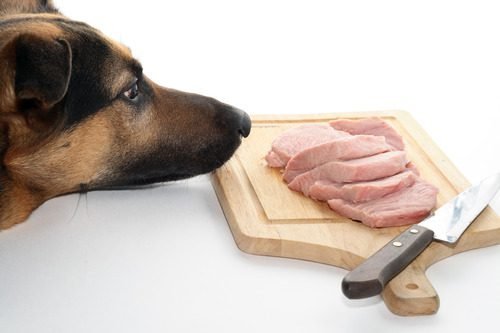
Ham isn’t a good choice for dogs. It’s very salty and fatty, which can upset their stomach and strain their organs.
Processed ham often has preservatives and seasonings that make it even worse. A small bite likely won’t harm your dog, but feeding ham regularly can cause serious health problems. Best to avoid it.
Is Homemade Salami Safer for Dogs?
Even homemade salami is not a good choice. It still contains salt and spices. Dogs do best with plain, unseasoned food.
If you want to share meat with your dog, always cook it without salt, garlic, or spices.
Can Dogs Eat Salami Slices
Dogs should not eat salami slices. They contain too much salt, fat, and spices that can upset a dog’s stomach. Even small slices can cause thirst, vomiting, or tummy pain, especially in small or sensitive dogs.
Can Dogs Eat Salami Bread
Dogs should not eat salami bread. It includes salami, salt, spices, and bread, which offer no health value. This mix can cause digestion problems, weight gain, and stomach upset if eaten more than once.
Can Dogs Eat Cooked Salami
Cooked salami is still unsafe for dogs. Cooking does not remove the high salt, fat, or spices. Eating cooked salami can lead to stomach pain, diarrhea, or serious health issues over time.
Can Dogs Eat Genoa Salami
Genoa salami is especially risky for dogs because it’s high in fat, salt, and spices like garlic or pepper.
These ingredients can cause digestive upset and, in large amounts, lead to dangerous health issues.
Even though dogs may love the smell, Genoa salami isn’t safe. It’s much better to offer plain, cooked lean meats instead.
Can Dogs Eat Prosciutto
Prosciutto is not safe for dogs. It’s heavily salted, cured, and sometimes seasoned with spices harmful to pets.
The high fat and salt content can lead to dehydration, stomach upset, or even long-term issues like pancreatitis. While a small nibble isn’t usually deadly, avoiding prosciutto and safe dog snacks is far healthier.
Can Dogs Eat Chorizo
Dogs should not eat chorizo. It is very spicy, salty, and fatty. These ingredients can irritate a dog’s stomach, cause vomiting, diarrhea, and may lead to pancreas problems if eaten.
Conclusion
In summary, Can Dogs Eat Salami highlights that salami is not a safe or healthy food choice for dogs and should be avoided to prevent health issues.While salami and other processed meats may tempt your dog, they aren’t safe or healthy treats.
The high salt, fat, and spices can cause stomach upset, pancreatitis, or worse. A small accidental bite usually isn’t dangerous, but regular feeding puts your dog at real risk. Choosing plain, cooked meats and dog-safe snacks is the simplest way to keep your pup healthy, happy, and safe.
FAQs
Is Any Amount of Salami Okay for Dogs to Eat?
A tiny bite won’t usually harm, but salami isn’t safe. Avoid it and choose healthier treats for your dog.
What If a Dog Eats a Whole Pack of Salami?
Call your vet immediately. Too much salami can cause salt poisoning, stomach pain, or pancreatitis, especially in smaller dogs.
What Are Alternatives to Salami?
Safer choices include plain cooked chicken, turkey, or lean beef. These provide protein without the dangerous salt and spices.
Can my dog eat pepperoni salami?
No, pepperoni salami is risky. It’s loaded with salt, fat, and spices that upset digestion and may cause long-term harm.
What deli meats can dogs eat?
Only plain, unseasoned turkey or chicken in small amounts. Avoid salted, cured, or spiced meats—unsafe and unhealthy.
Can dogs eat popcorn?
Plain, air-popped popcorn without butter, oil, or salt is safe in moderation. Flavoured or heavily salted popcorn should be avoided.
Can dogs eat hot dogs?
Hot dogs aren’t healthy for dogs. They contain salt, fat, and additives. A small piece rarely harms, but avoid regular feeding.
Can dogs eat ice cream?
Most ice cream isn’t safe. It’s sugary, and many dogs can’t digest dairy well. Offer dog-friendly frozen treats instead.
